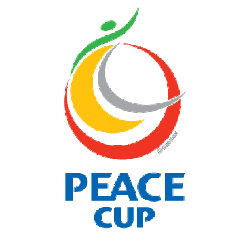Peace Cup
 | |
| Organising body | Sunmoon Peace Football Foundation (Unification Church) |
|---|---|
| Founded | 2003 |
| Abolished | 2012 |
| Region | International |
| Most successful club(s) | (1 title each) |
| Website | peacecup.com |
The Peace Cup was an invitational pre-season friendly football tournament for club teams which was held every two years by the Sunmoon Peace Football Foundation.[1] It was usually contested by eight clubs from several continents, though 12 teams participated in 2009. The first three competitions were held in South Korea, and the 2009 Peace Cup was held in Madrid and Andalusia, Spain.[2][3] Previous winners are PSV, Tottenham Hotspur, Lyon, Aston Villa, and Hamburger SV, who were the final champions.
The tournament was originally organised and held in South Korea and contested in 2003, 2005, and 2007 between eight clubs from various countries, including the Seongnam Ilhwa Chunma, which is owned by the organizing company.
A corresponding event featuring women's national teams, the Peace Queen Cup, began in 2006.[4]
History and format
Since 2003, the Peace Cup is being held every two years, the Sunmoon Peace Football Foundation invites football clubs from various nations. South Korea's Seongnam Ilhwa Chunma participates in every tournament as both the club and foundation are sponsored by the same organization, the Unification Church.
From 2003 to 2007, the Peace Cup was played between eight clubs, divided into two groups of four teams. The winner of each group qualified for the final, which was played in a single match. 2009 Peace Cup Andalucia was held in Spain, and 12 teams participated in the competition.
The fifth competition took place again in South Korea in July 2012, and four teams which had South Korean players entered.[5] In October 2012, it was announced that the Peace Cup will no longer be held, following the death of Unification Church founder Sun Myung Moon.[6]
Prize
From 2003 to 2007, the prize money of the tournament was approximately €2 million for the winning team,[7][8] and €500,000 for the runners-up.[7]

Results
Finals
| Year | Host | Champions | Score[9] | Runners-up | Teams |
|---|---|---|---|---|---|
| 2003 | 1–0 | 8 | |||
| 2005 | 3–1 | 8 | |||
| 2007 | 1–0 | 8 | |||
| 2009 | 0–0 (a.e.t.) (4–3 p) |
12 | |||
| 2012 | 1–0 | 4 |
Titles by club
| Team | Champions | Runners-up |
|---|---|---|
| 1 (2007) | 2 (2003, 2005) | |
| 1 (2003) | — | |
| 1 (2005) | — | |
| 1 (2009) | — | |
| 1 (2012) | — | |
| — | 1 (2007) | |
| — | 1 (2009) | |
| — | 1 (2012) |
Awards
The "Golden Ball" is awarded to the player on the basis of a vote taken among the media accredited to each Peace Cup tournament. There are also "Silver Ball" and "Bronze Ball" for the second and third best players respectively.[10][11]
| Year | Golden Ball | Golden Shoe |
|---|---|---|
| 2003 | ||
| 2005 | ||
| 2007 | ||
| 2009 | ||
| 2012 |
Controversy
The original name of the competition was to be Sunmoon Peace Cup, named after Sun Myung Moon, the founder of the Sunmoon Peace Football Foundation. However, after being criticized that it was too religious, the organization changed its name to World Peace King Cup and started preparation for its first tournament. Before the inauguration of the cup, the Asian Football Confederation warned that the term "world" can only be used by competitions organized by FIFA, and "king" can be used by competitions held by a kingdom.[12]
See also
References
- ^ "Warming Up for the Kick-off". The Wall Street Journal. 2 August 2010.
- ^ "Jerez se convierte hoy en una de las sedes oficiales de la 'Peace Cup 2009'" (in Spanish). AndaluciaPress. Archived from the original on 22 April 2009. Retrieved 14 June 2008.
- ^ "Peace Cup might go to Spain". The Washington Times. Retrieved 14 June 2008.
- ^ "Peace Queen Cup 2006". RSSSF. Retrieved 14 June 2008.
- ^ 국제 클럽축구대항전 피스컵, 2012년 한국 개최. Naver.com (in Korean). Sports Seoul. 2 August 2011. Retrieved 11 October 2011.
- ^ "Church Scraps Peace Cup". Super Sport. 29 October 2012.
- ^ a b "Sundowns in Peace Cup". BBC. 27 January 2005. Retrieved 14 June 2008.
- ^ "Galaxy to compete in inaugural World Peace King Cup". USA Today. 5 February 2003. Retrieved 14 June 2008.
- ^ "Peace Cup History". Goal. Retrieved 15 July 2009.
- ^ "who will win the gold?". daum.net (in Korean). 19 July 2007. Retrieved 15 July 2009.[permanent dead link]
- ^ "Park chosen best player of the Peace Cup". PSV Eindhoven. 22 July 2003. Retrieved 1 July 2017.
- ^ "History of Peace Cup". Naver.com (in Korean). JoyNews24. Archived from the original on 19 July 2012. Retrieved 2 August 2009.
